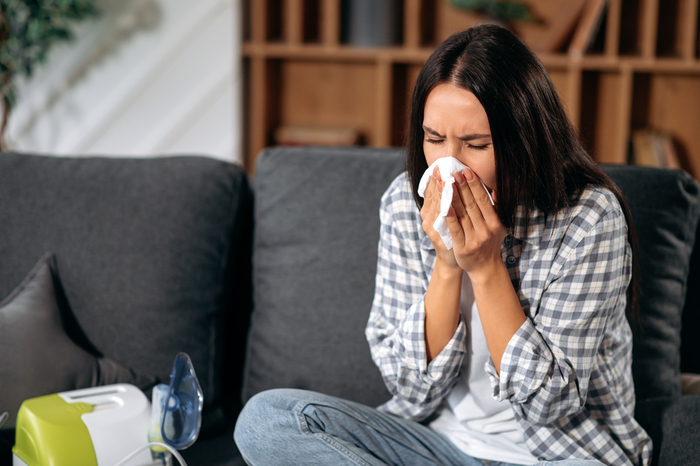Key points
- Mold allergies, caused by the immune system's reaction to mold spores, are common and can cause a range of symptoms.
- Different types of mold, such as Alternaria and Aspergillus, can trigger varying allergic responses.
- Risk factors for developing mold allergies include a family history of allergies, occupational exposure, high indoor humidity, and poor ventilation.
- Treatment for mold allergies includes reducing exposure, mold removal, improving indoor air quality, medication, immunotherapy, and consultation for asthma.
- Treatment options for mold allergies range from reducing exposure and improving indoor air quality, to medication, immunotherapy, and asthma consultation. Severe cases may require urgent medical attention.

Mold allergies are a common affliction that can cause a variety of symptoms and discomfort for many individuals. With an estimated 1000 species of mold present in the United States alone, according to the American College of Asthma, Allergy, and Immunology (ACAAI), these fungi are a pervasive part of our environment, both indoors and out.
Reactions to mold can vary significantly from person to person, with some individuals experiencing mild symptoms and others facing more severe allergic responses. In this article, we will explore the different types of mold allergies, the symptoms they can provoke, their underlying causes, and the available treatment options to help manage and alleviate the discomfort they can bring. Whether you're someone who suffers from a mold allergy or simply seeking to understand this condition better, this guide aims to provide valuable insights into the world of mold-related hypersensitivities.
Can Mold Cause Allergies?
Mold is not just an unsightly presence in homes and buildings; it can also be a significant trigger for allergic reactions in many individuals, according to the Mayo Clinic. They explain that the connection between mold and allergies is a topic of concern for those who find themselves regularly exposed to these ubiquitous fungi. In this section, we delve into the question of whether mold can indeed cause allergies, examining the nature of mold spores and the body's response to them.
According to the Mayo Clinic, mold allergies occur when the immune system overreacts to the inhalation of mold spores, treating these tiny particles as dangerous invaders. Mold spores are essentially microscopic seeds that allow mold to reproduce and spread, according to the Cleveland Clinic. They explain that these spores are released into the air in large numbers and can be found both indoors and outdoors. When these spores are inhaled by someone with a mold allergy, their immune system can mistakenly identify them as a threat, triggering an allergic reaction. This reaction is the body's way of trying to defend itself from what it perceives as harmful substances, according to the Cleveland Clinic.
The spores that contribute to mold allergies are a natural part of the mold's life cycle, according to the Cleveland Clinic. They note that molds rely on these spores to propagate and colonize new areas, especially those with ample moisture, warmth, and nutrients. While mold spores are a common and generally harmless component of household and outdoor dust, in sensitive individuals, they can provoke symptoms such as sneezing, runny nose, itchy eyes, and even asthma attacks. The severity of the allergic reaction can vary widely among different people, with some experiencing minor irritations and others suffering from more debilitating symptoms, according to the Mayo Clinic. Understanding the role of mold spores in allergies is crucial for managing and preventing allergic responses in sensitive individuals.
Most Common Types of Mold Allergies
Mold allergies can be triggered by different types of mold, each with its own characteristics and potential for causing allergic reactions, according to the Asthma and Allergy Foundation of America (AAFA). They note that the following are some of the most prevalent types of mold that can elicit allergic responses:
-
Alternaria
-
Aspergillus
-
Cladosporium
-
Penicillium
-
Stachybotrys
Understanding the specific characteristics and allergenic potential of these molds is essential for individuals who may be susceptible to mold allergies, as it can help in identifying and managing exposure to these common allergens, according to the Mayo Clinic.
Mold Exposure Symptoms
Mold exposure can lead to a range of allergic reactions and respiratory issues, impacting individuals differently based on their sensitivity and the type of mold present, according to the AAFA. They list the following as some common symptoms associated with mold exposure that may mimic allergy symptoms, such as:
-
Itchy nose, eyes, throat
-
Sneezing
-
Coughing
-
Nasal congestion
-
Runny nose
-
Mucus in the throat
Recognizing these mold allergy symptoms is crucial for identifying potential mold-related health concerns and seeking appropriate medical advice and intervention, according to the AAFA.
What Causes Mold Allergies?
Mold allergies are triggered by the body's immune system responding to specific mold spores as harmful invaders, according to the Cleveland Clinic. They explain that when an individual with a mold allergy inhales or comes into contact with mold spores, their immune system can produce antibodies as a defense mechanism. These antibodies, known as immunoglobulin E (IgE) antibodies, recognize and bind to the mold spores, initiating the release of chemicals such as histamine that lead to allergic symptoms.
It's important to note that not all molds cause allergies, and only certain types of mold spores can elicit allergic reactions in susceptible individuals, according to the Cleveland Clinic. The allergenic potential of molds varies, and some molds are more likely to provoke allergic responses than others. Additionally, allergic reactions to mold can manifest as either immediate or delayed responses, with immediate reactions occurring shortly after exposure and delayed reactions developing over a longer period of time, according to the Cleveland Clinic. They note that understanding these nuances can help individuals identify and mitigate their exposure to molds that may trigger allergic symptoms.
Risk Factors of Mold Allergies
In this section, we will explore the various risk factors that can contribute to the development or exacerbation of mold allergies. Understanding these risk factors is crucial for individuals who may be susceptible to mold-related allergic reactions.
The following are some common risk factors associated with mold allergies, according to the Cleveland Clinic:
-
Family history of allergies: Genetics play a role in predisposing individuals to allergic conditions, including mold allergies. Having a family history of allergies can increase the likelihood of developing mold-related allergic responses.
-
Occupational exposure: Working in environments with high mold exposure, such as construction sites, agricultural settings, or buildings with water damage, can heighten the risk of developing mold allergies or experiencing worsened allergic symptoms.
-
Indoor humidity: Living in a home with high indoor humidity levels can create an environment conducive to mold growth, increasing the likelihood of mold exposure and subsequent allergic reactions.
-
Poor ventilation: Inadequate ventilation in living or workspaces can lead to the accumulation of moisture, creating conditions favorable for mold growth. Poor ventilation can exacerbate mold allergies by increasing exposure to mold spores in the air.
Recognizing these risk factors can help individuals take proactive measures to minimize their exposure to mold and mitigate the impact of mold allergies on their health.
Mold Allergies Treatment
Managing mold allergies involves a combination of preventative measures and targeted treatments to address allergic reactions, according to the Cleveland Clinic. They explain that the following are some effective ways to treat mold allergies:
-
Reduce exposure: Avoiding damp and mold-prone areas with poor ventilation can help minimize exposure to mold spores, reducing the risk of allergic reactions.
-
Mold removal and repair: Cleaning and eliminating mold in the home environment, as well as promptly addressing any leaks or water damage, can reduce the presence of mold and mitigate allergic responses.
-
Improve indoor air quality: Enhancing air flow and using appropriate filters in air conditioning systems can help reduce the concentration of mold spores indoors, contributing to a healthier indoor environment for individuals with mold allergies.
-
Medication: Over-the-counter antihistamines or nasal steroids can provide relief from mold allergy symptoms, helping to alleviate nasal congestion, sneezing, and other allergic reactions.
-
Immunotherapy: For individuals with severe or persistent mold allergies, allergy shots (immunotherapy) may be recommended to desensitize the immune system and reduce allergic responses over time.
-
Consultation for asthma: If mold allergies coexist with asthma, seeking professional medical advice and management is essential for comprehensive treatment and control of respiratory symptoms.
Implementing these treatment strategies can help individuals with mold allergies effectively manage their condition and reduce the impact of mold-related allergic reactions on their daily lives.
Urgent care near me
If you believe you are allergic to mold or experience severe or unmanageable mold allergy symptoms, seeking prompt medical attention at an urgent care facility is important. Symptoms such as difficulty breathing, wheezing, chest tightness, or severe allergic reactions may warrant immediate medical assessment and treatment, according to the Cleveland Clinic.
At urgent care, healthcare professionals can evaluate your symptoms, provide appropriate interventions such as prescription medications or breathing treatments, and offer guidance on managing mold allergies. Seek timely care at an urgent care near you by using SolvHealth.
FAQs
What causes mold allergies?
Mold allergies are caused by the immune system's overreaction to mold spores, treating them as harmful invaders and causing allergic symptoms.
What are the symptoms of mold allergies?
Symptoms can include sneezing, runny nose, itchy eyes, and in severe cases, asthma attacks.
What are some common types of mold that can cause allergies?
Some common types of mold that can cause allergies include Alternaria, Aspergillus, Cladosporium, Penicillium, and Stachybotrys.
What are the risk factors for developing mold allergies?
Risk factors include a family history of allergies, occupational exposure to mold, high indoor humidity, and poor ventilation.
How can mold allergies be treated?
Treatment options include reducing exposure to mold, removing mold from the environment, improving indoor air quality, taking medication, immunotherapy, and seeking professional advice for managing asthma.
Can anyone develop a mold allergy?
Yes, anyone can develop a mold allergy, but certain factors such as family history of allergies and occupational exposure to mold can increase the risk.
Can mold allergies be prevented?
While not entirely preventable, reducing exposure to mold, improving indoor air quality, and maintaining a low indoor humidity can help reduce the risk.
What is the role of the immune system in a mold allergy?
In a mold allergy, the immune system overreacts to specific mold spores, treating them as harmful invaders and causing an allergic reaction.









